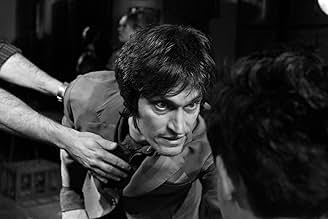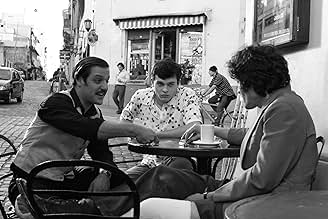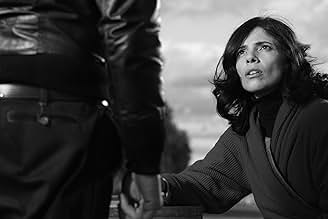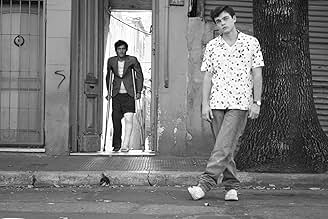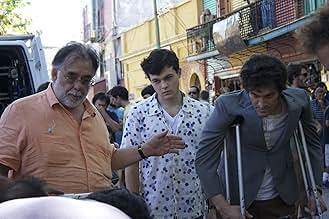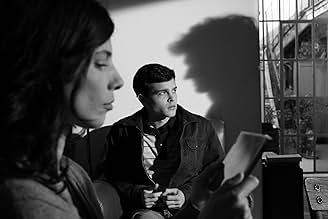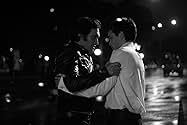Tetro
- 2009
- Tous publics
- 2h 7min
Bennie se rend à Buenos Aires pour retrouver son frère aîné disparu depuis longtemps, un écrivain autrefois prometteur qui n'est plus que l'ombre de lui-même. Il découvre la pièce inachevée ... Tout lireBennie se rend à Buenos Aires pour retrouver son frère aîné disparu depuis longtemps, un écrivain autrefois prometteur qui n'est plus que l'ombre de lui-même. Il découvre la pièce inachevée de son frère, et cela pourrait leur permettre de comprendre leur passé commun et de resser... Tout lireBennie se rend à Buenos Aires pour retrouver son frère aîné disparu depuis longtemps, un écrivain autrefois prometteur qui n'est plus que l'ombre de lui-même. Il découvre la pièce inachevée de son frère, et cela pourrait leur permettre de comprendre leur passé commun et de resserrer leur lien.
- Réalisation
- Scénario
- Casting principal
- Récompenses
- 1 victoire et 6 nominations au total
- José
- (as Rodrigo De La Serna)
- Ana
- (as Érica Rivas)
- María Luisa
- (as Sofía Castiglione)
Avis à la une
There's a lot of pain about failed ambitions too. Tetro (a mean, brooding Vincent Gallo;"tetro" means 'sad' or 'dark' in Italian), a would-be writer, is hiding away in Buenos Aires, the birthplace of his father, when his younger brother Bennie (excellent newcomer Alden Ehrenreich) appears one night in the pristine white uniform of a cruise ship employee. The action thenceforth is an off-and-on wooing of Tetro by Bennie. Bennie wants to recover his childhood when he worshiped Angelo, as he was then. "Angelo's dead," Tetro repeats. Bennie has felt abandoned for a decade. He is almost eighteen, and ran away from military school and lied about his age to get the job on the ship. Now Tetro does not welcome Bennie at all and keeps saying he ought to stay with someone else or return to the boat, which is docked for repairs.
The 'Godfather' films are full of brother and father rivalries too, but because this film is about waywardness and is in coldly beautiful digital black and white with moments of intense color, it more strongly recalls Coppola's similarly color-highlighted black and white version of S.E. Hinton's 'Rumblefish,' where Mickey Rourke played the dangerous, disreputable but romantic older brother and Matt Dillon the younger one who has missed him.
This certainly isn't Tusa, though. It's Argentina, but also an alternately windswept and mountainous Patagonia, and a world of pure cinematic imagination highlighted by trips into intense Fifties Technicolor with The Red Shoes and The Tales of Hoffman and Copola's own strange evocations of that lushly artificial style. Flashbacks in less intense color recall the father -- perhaps one should write "the Father" -- Carlo Tetrocini (Klaus Maria Brandauer), born in Buenos Aires of Italian family, a composer and orchestra leader hailed as a genius. Carlo has stifled the ambitions of another musical composer brother (played by Brandauer in heavy makeup) and seems to have driven Tetro (Gallo) mad. Tetro lives a bipolar, cosmopolitan life with a warm and sexy Spanish lady called Miranda (Maribel Verdú: we know her from 'Y tu mamá también' and 'Pan's Labyrinth') who discovered him when he was in an asylum and she was a visiting entertainer. Tetro has all but abandoned his magnum opus, a play he can't finish, and works in a theater where he does the lighting.
One can hardly attribute the resentment of the father to Coppola himself; his own father was a minor musician best known for composing music for Coppola's films. Perhaps he himself is the evil father? But then what to make of Sofia Coppola, the acclaimed and successful daughter, a fine director in her own right? The Oedipal themes that arise may be more universal than autobiographical. The mother in Tetro however, is partly missing from the equation, a shadowy figure who who died in a car accident when Tetro/Angelo was driving. There are so many references to accidents one begins to fear one every time somebody goes out. And indeed walking a dog proves dangerous.
Bennie discovers Tetro's hidden manuscripts, which, like hidden memories, are written in mirror writing he says is "military school code." Among various Argentinian friends the youth meets "the most famous critic in Latin America," a woman who calls herself "Alone" (Carmen Maura, another Spanish actress, whom we know from films by Pedro Almodóvar). When Benie first arrives, Tetro has a broken leg. Later he breaks a leg himself, and while recovering he transcribes the MS. into normal writing and adds an ending. "Alone" runs an arts festival in Patagonia, and he has the unwitting collaboration translated into Spanish and enters in the festival competition, which it wins. Tetro rejects all this. Gallo's evocations of depression, anger, and hostility are extremely realistic. His final revelations and eventual warm acceptance of Bennie, whose accident causes him to miss his boat, are perhaps less convincing, though his performance is strong. Ehrenreich, who sometimes resembles a young, but more physically solid Leo DiCaprio, is touching and appealing.
It's not clear at first what the Powell/Pressberger 'Red Shoes' and 'Tales of Hoffman' have to do with the story, except that Tetro took Bennie to see them. But they illustrate a sensibility so steeped in cinema that it can't evoke emotion without remembering films. Everything in Tetro is highly artificial, or simply cinematic, but also convincingly emotional. The tensions between the brothers have been compared to those in Kazan's 'East of Eden,' and Coppola indeed thought of Kazan in making this film and has spoken of a felt rivalry with him. The Patagonian arts festival sequences recall both Fifties comedies and Fellini. For all this artificiality, the film stirred up plenty of discomfort in me. One can perfectly well awaken painful emotions by mimicking old films, as Todd Haynes did in his odd pastiche of Douglas Sirk, 'Far From Heaven.' 'Tetro' doesn't feel resolved; it has a little of the rambling incoherence of 'Youth Without Youth,' except that it is so much more intensely felt. Above all it is a unique work that is beautiful to look at and keeps one guessing. Coppola has said this is the kind of movie he wanted to make when he was young. Very well, it's a bit late for that; but why not?
Tetro is, at its core, a film about family, in particular the relationship between brothers and their Father. A theme Francis Ford Coppola has immersed himself in before, most notably in The Godfather and Rumble Fish. Through a series of flashbacks we are given a glimpse of major events in Tetro's youth, his relationship with his father (played by Klaus Brandauer) and his subsequent departure. There are huge family secrets known only to Tetro and revealed to Bennie in an ending which echoes great literary and operatic works. Coppolas love of opera and theater is stamped all over the script and the city of Buenos Aires seems to be the perfect background in which to set this story.
Shot stunningly in digital monochrome with colour flashbacks, it has some aesthetic similarities to Rumble Fish. Coppola and cinematographer Mihai Malaimare Jr. reportedly site On The Waterfront and La Notte as big influences on the films visual style. There are certainly elements of both here, with the film also retaining its visual sense of self. It is operatic in both its narrative and its mise-en-scene. The idea of cutting between colour and monochrome as well as changing aspect ratios sounds as if it would be jarring, and it typically is. But for the purposes of Tetro it works perfectly.
Seen as a controversial choice by some, Vincent Gallo brings an edge to the titular character that some other actors may have lacked. However it is newcomer Alden Ehrenreich who steals the show as Bennie, a wayward teenager looking for guidance and approval. Maribel Verdu, as Miranda, provides the conduit between the two in a typicaly solid performance.
Hollywood is littered with once great directors who have fallen from grace, which makes Tetro all the more remarkable as a return to form from one of the greatest, Francis Ford Coppola.
Benjamin Tetrocini (Alden Ehrenreich) arrives in Buenos Aires and goes to visit his brother Angelo (Vincent Gallo). The embittered Angelo is now going by the name Tetro. As the movie progresses, a series of important topics about the family gets revealed, and how it has always affected the relationship between the two brothers.
Coppola uses one of the most unusual devices to tell the story. The present is filmed in stark black-and-white, while the past is shown in a slightly grainy color. It's as if the past was supposedly apparent - to show that the characters thought that they knew everything that was going on - while the present is supposedly unclear (to show that there are things to be discovered). I read that the movie pays homage to "The Tales of Hoffman", but I don't know that one, so I have to take the movie at face value. And what I saw certainly impressed me. I definitely recommend this movie.
Also starring Maribel Verdú, Carmen Maura, Klaus Maria Brandauer, and Rodrigo de la Serna (who co-starred in "The Motorcycle Diaries" and is a relative of Che Guevara).
Le saviez-vous
- AnecdotesFrancis Ford Coppola claimed that this is the kind of film he set out to make as a young man, before he was sidetracked by fame and fortune.
- GaffesEarly in the movie Tetro stumbles into the kitchen with a broken leg and knocks over some furniture while lighting a cigarette using a burner on the stove. he ignites the burner by just turning the knob on the stove. A few minutes later Miranda must use a match to light a burner on the same stove-top.
- ConnexionsFeatured in At the Movies: Cannes Film Festival 2009 (2009)
- Bandes originalesEl Búho
(2007) (uncredited)
Written & Performed by Lisandro Aristimuño
Courtesy of Los Años Luz Discos SRL
Meilleurs choix
- How long is Tetro?Alimenté par Alexa
Détails
- Date de sortie
- Pays d’origine
- Langues
- Aussi connu sous le nom de
- Francis Ford Coppola's Tetro
- Lieux de tournage
- Sociétés de production
- Voir plus de crédits d'entreprise sur IMDbPro
Box-office
- Budget
- 5 000 000 $US (estimé)
- Montant brut aux États-Unis et au Canada
- 518 522 $US
- Week-end de sortie aux États-Unis et au Canada
- 30 504 $US
- 14 juin 2009
- Montant brut mondial
- 2 874 474 $US
- Durée
- 2h 7min(127 min)
- Couleur
- Mixage
- Rapport de forme
- 2.35 : 1







